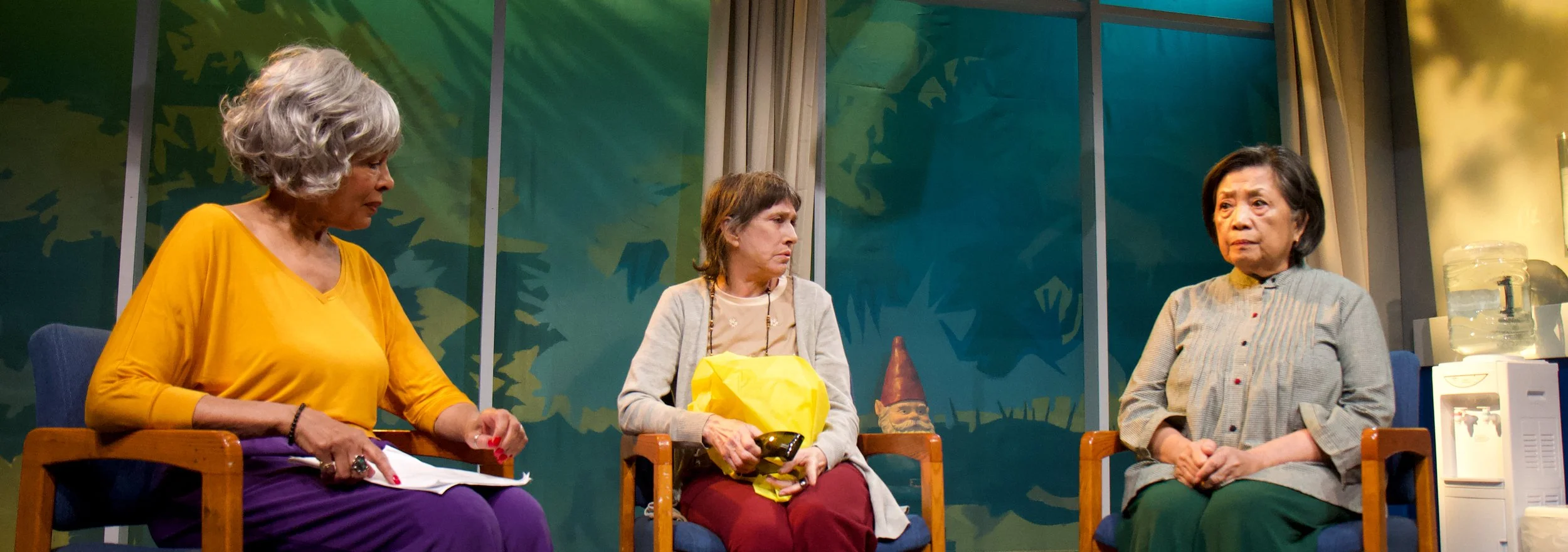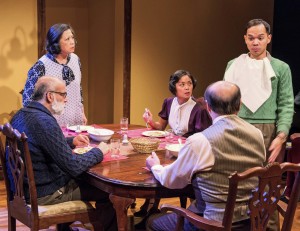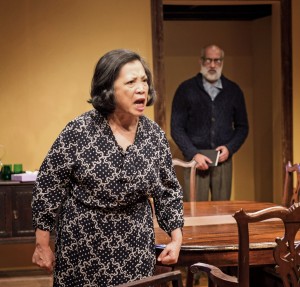In William Shakespeare’s Richard III, the title character is a hunchback whose anger is fueled because he feels like an outcast. His quest for power becomes a form of revenge. Under Robert O’Hara’s direction, Richard III for the Public Theater is loose and playful. Actress Danai Gurira, in the gender-swapped title role, is sinewy and tiger-like. As Richard, she pounces, manipulates, smiles, grins, and grimaces: a shape-shifter who manipulates others.
The Merchant of Venice
When most people think of Shakespeare’s The Merchant of Venice, it's Shylock who springs to mind, not the titular merchant. As a Jew in a Christian city-state, Shylock is an outsider; as a moneylender in an economy that reviles usury, he’s a pariah. Director Arin Arbus has chosen John Douglas Thompson, one of the most accomplished classical actors of his generation, as Shylock in her modern-dress production at Theatre for a New Audience (TFANA). Thompson, reportedly the first Black actor to play Shylock professionally in New York, finds music even in the most acidic passages of the Bard’s rhetoric; his nuanced performance explodes at crucial points, with moral indignation outstripping self-pity.
Meet the Bergers
The lives of the Berger family in Awake and Sing!, The Public Theater's production of Clifford Odets’ rousing Depression-era drama, sway to the swinging beat of old Hollywood’s silver screen. There is the drama of a young, forbidden love affair, the scandal of a child out of wedlock, the emotional carnage of lost hope and disillusionment. Rudolph Valentino receives a passing mention, and Fred Astaire croons about dancing cheek-to-cheek during intermission. Odets’ seminal play packs quite a sentimental wallop, but the National Asian American Theater Company's (NAATCO) touching revival featuring Asian-American actors in the largely Jewish-American roles, counters any mawkishness with strong, complex performances and director Stephen Brown-Fried’s confident steering.
Odets’ play centers around a Jewish family living in 1930s Bronx, and the ensuing turbulence that follows the growing restiveness of Ralph Berger (an appropriately energetic Jon Norman Schneider) and the breaking and building of Hennie Berger’s spirit (an evolution played to utter ferocity by Teresa Avia Lim). The siblings’ mother is Bessie Berger (Mia Katigbak, reprising a 2013 award-winning performance), stalwart matriarch of the family and brusque caretaker of her children’s lives. Mr. Berger (an endearingly soft-spoken Henry Yuk), on the other hand, trots about the apartment harmlessly. Rounding out the family is disillusioned academe and occasional grandfather-figure (a sage Alok Tewari) and the ever-present vitriol and violent passions of one-legged war veteran Moe Axelrod (a fantastically complex, utterly resplendent Sanjit De Silva), who has a "yen" for Hennie.
Much of the production’s conflict is courtesy of De Silva and Lim’s fiery chemistry, and Brown-Fried makes us anticipate their acerbic confrontations with glee. But aside from Ralph Berger’s erratic bursts of youthful, reckless energy (egged on by a philosophizing Jacob), the Berger kids don’t provide half as much vigor to Awake and Sing! as Katigbak’s Bessie does. Shamelessly guilt-tripping her way to what she thinks is a secure future for her children, Bessie is an unsympathetic antihero, and she dominates the power plays that rattle the household. Only Lim seriously challenges Katigbak’s governance, with Hennie’s caustic sarcasm and world-weary cynicism rivaling that of her mother’s.
Dusty browns, maroons and beiges color the set, as well as the costuming. Alexae Visel gives Bessie Berger matronly, no-nonsense dresses, while fitting Hennie with form-flattering skirts and black-buckled heels. The men get high-waist pants, oxfords and suspenders. Their fashion is reminiscent of silver screen lotharios and starlets, but Visel has imbued the clothes with hints of wear and tear. It’s occasionally difficult to catch a front view of the actors; the Public has staged the production in such a way that the performance space is sandwiched between two opposing rows of audiences. Sometimes, the effect can be quite stirring; Brown-Fried and scenic designer Anshuman Bhatia have cleverly made the space between the sofa and the dinner table into a battleground. Hennie and Moe’s emotional altercations take place in that no-man’s land, as does Ralph’s rebellious profession of love and Bessie Berger’s strict admonishments of her children.
NAATCO’s hope to carry out theater’s function in “taking people who were viewed as marginalized, and place them at the center of culture” is perhaps done so well, that we altogether forget that there is a Berger family. The characters seem to take on roles that are familiar and universal to everyone in the audience: an overbearing mother, a reckless teenage brother or a vicious old flame. Love songs from Hollywood’s Golden Age have audiences tapping their feet and humming, and the familiar twang of Bronx accents have us settling in comfortably, although hearing "goil" instead of "girl" soon trespasses on the ear. Subsequently, the supposed novelty of casting Odets’ typically Jewish-American drama with an Asian-American cast quickly dissolves; we are quite contentedly left with a fresh new realization of the Berger family. And it’s quite a sight to see.
NAATCO’s production of Awake and Sing! ran till August 8. For more information, visit www.publictheater.org.










